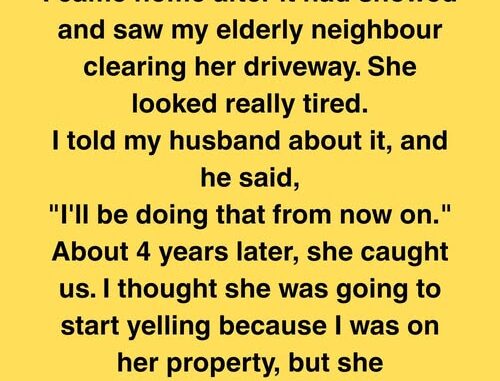
When our elderly neighbor, Felicita Aguilar, caught us tending her garden, we thought we’d overstepped. Her warm smile and a hidden gift changed our lives, revealing a woman we never truly knew.
It was a chilly March morning in our small Oregon town, after a storm left branches scattered across yards. I noticed our neighbor, Mrs. Felicita Aguilar, struggling to rake her garden, her movements slow. I told my husband, Renan, and he said, “I’ll take care of it from now on.”
For three years, we quietly tended her garden after storms, clearing leaves and twigs before dawn. Feli’s yard was steep, with uneven stones that tripped her up, and we worried she’d fall. We tried offering help directly once, but she waved us off with a proud smile, so we kept it secret, slipping out while our daughter, Lia, slept.
One spring morning in 2025, she caught us. I was pulling weeds, Renan trimming branches, when Feli stepped onto her porch. “Got you two,” she said, grinning, holding a steaming teapot. I froze, rake in hand, expecting a scolding for trespassing. Instead, she said, “Come in for tea.”
We followed, puzzled. Her home smelled of cinnamon and worn leather, with faded quilts draped over chairs and a shelf of family photos, some faces appearing only once. “Call me Feli,” she insisted, pouring tea into chipped mugs. “You’ve been kind. Let me repay you.”
We brushed it off, saying it was nothing, but she handed us warm scones on mismatched plates. “You remind me of my daughter-in-law,” she said, eyes distant. “Before she passed.”
Renan and I exchanged glances. We’d lived next door for six years, calling her “our neighbor,” never knowing she had a son. “He’s in Arizona,” she said plainly. “Haven’t seen him or my granddaughter in ten years. We argued—stupid things, pride mostly.”
We stayed for an hour, listening as she spoke of her late husband’s love for fishing, her rosebushes, and the library she volunteered at before it closed. That day shifted everything.
We didn’t just garden anymore. I started bringing her casseroles; Renan fixed her creaky porch steps. Feli taught Lia to knit, her hands steady despite her age. She’d slip us small gifts—a jar of apricot preserves, a handwritten card, a quilt square for Lia. “You’ve got a bright spirit,” she told Lia once, tying a scarf around her neck.
One day, she gave Renan an old fishing rod. “My husband’s,” she said. “It suits you.” Renan, usually reserved, held it like a treasure, his eyes soft.
Then came the letter. In July, we found an envelope in our mailbox, no stamp, addressed to “The Gutierrez Family.” Inside, a note in Feli’s neat cursive: “Please talk to me before selling your home.”
I hurried next door. Feli looked frail but calm, a packed bag by her door. “I’m going to see him,” she said, meaning her son. “It’s time.”
I squeezed her hand. “You’ll be okay.”
She left the next day, asking us to feed her cat and clear her fridge. Weeks passed without word. Worried, I called the number on a recipe card she’d given me.
A young woman answered. “This is Maria, Feli’s granddaughter.”
My heart raced. “Is she okay?”
“She’s here,” Maria said softly. “She had a heart scare on the trip, but she’s stable now.”
Maria passed the phone to Mauro, Feli’s son. His voice was heavy. “She’s weak, but she’s fighting. The heart issue hit hard.”
We flew to Arizona that weekend, bringing Lia. Feli was thinner, her smile slower, but it lit up when she saw us. She touched Lia’s face, saying her name softly. Mauro watched from the corner, arms crossed.
At their home, Maria showed us a box of Feli’s things—knitted coasters, letters, a photo of Lia knitting. “She sent this last year,” Maria said. “We didn’t know who she was.”
“That’s our girl,” I said, heart swelling.
Mauro softened, admitting he’d held grudges over old family rifts—missed visits, harsh words after his wife’s death. Seeing Feli’s love for us cracked his defenses. “Maybe I was wrong,” he murmured.
Before we left, he hugged Feli, tears in his eyes, their first embrace in years.
Feli passed a month later. A lawyer’s letter arrived, revealing she’d left us her garden tools—a set her husband crafted, stored in a shed we’d never noticed. A note inside read: “If they feel like home, keep them. If not, pass them on.”
We didn’t keep all the tools. After talking with Mauro and Maria, we gave them half, keeping a few for our garden. Maria teared up, saying Feli would’ve approved.
Now, we use those tools every spring, planting roses like Feli’s. Sometimes, we clear other neighbors’ yards, quietly, just as we did for her. Her kindness taught us that small acts can bridge hearts, revealing depths we never expect.
What’s a small kindness you’ve shared or received? Share below—it might touch someone who needs it.